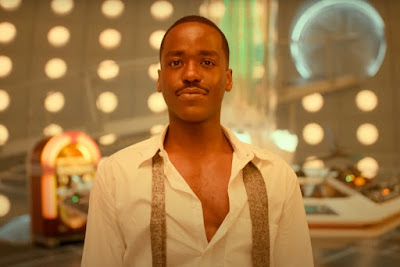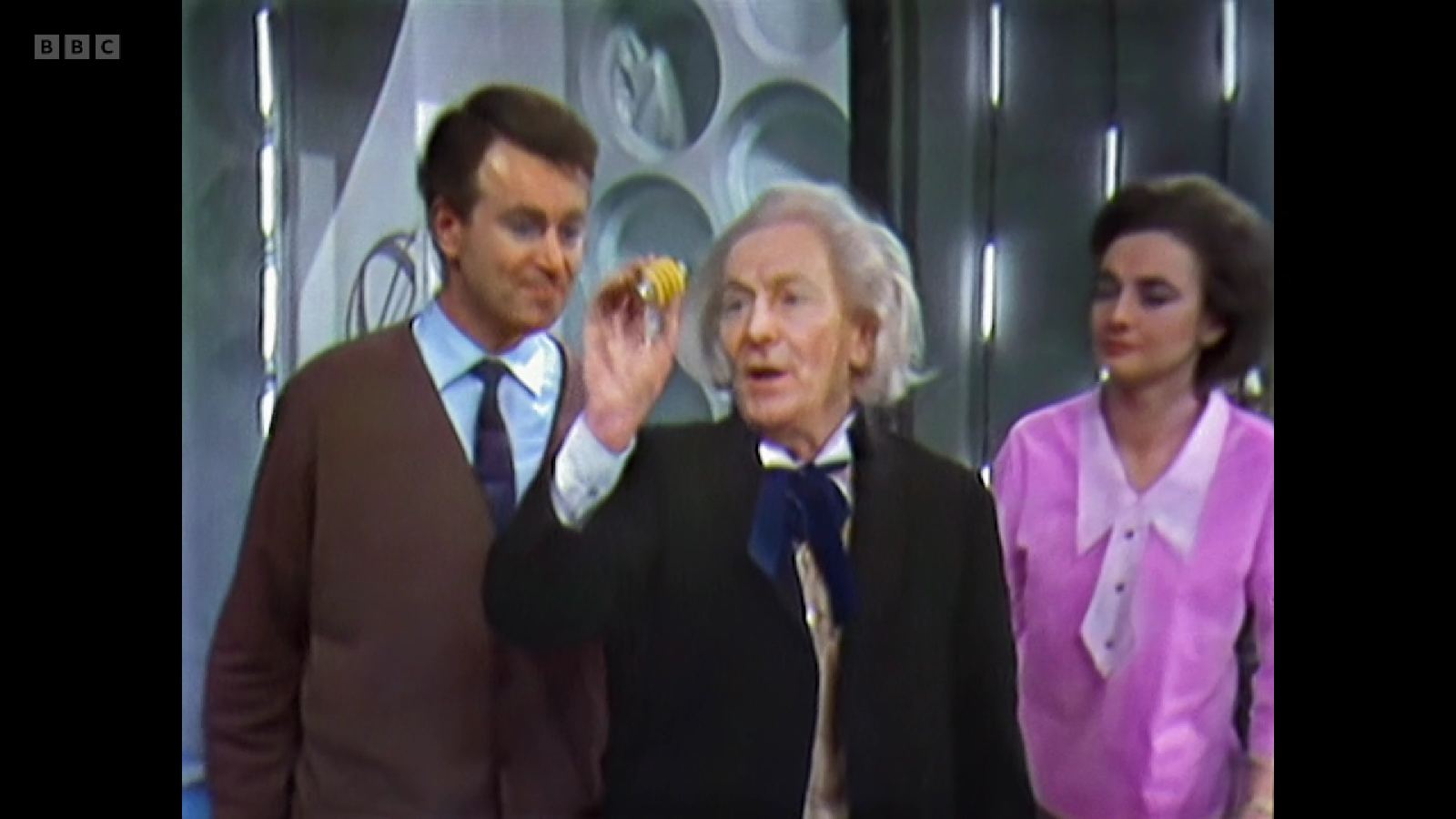It can always be quite daunting when a new Doctor arrives, and in this case, it's probably more than usual as here we have a Doctor without any 'baggage', a new bi-generated Doctor, newly created, and having left all his angst, past, tiredness and issues with his previous self - allowing the Doctor as a whole to heal on Earth with a new 'family'. And here we have Ncuti Gatwa as the 15th Doctor ... in his first proper adventure since he split from his previous self. It's a great way to reboot the show for (another) new audience and to bring it all up to date for the rest of its 7th Decade.
There's a lot going on here of course, and a lot to enjoy and appreciate. And as it's a Christmas Special to boot, there's that element to try and include as well ...
The whole Christmas thing is perhaps of the least impart here: it happens to be new companion Ruby Sunday's birthday, and there's a church, and snow on the ground, and Christmas decorations all around of course ... but it has (or seems to have) no bearing on the actual plot.The plot is fairly simple: Ruby Sunday (Millie Gibson) is now 18 years old, and she was discovered outside a church on Christmas Eve. She was taken in by a foster family and named Ruby (after the name of the street that the church was in). Now she's finding that she has hit a rash of bad luck as a load of time-bimbling goblins have decided to make her unlucky (and those she encounters) as prelude to taking another baby (called Lulu-Belle) on Christmas Eve in order to feed it to the Goblin King.
The Doctor (Ncuti Gatwa) has become aware of Ruby's bad luck and is trailing her ... popping up in a nightclub where she plays piano/synth on stage, and in a club where she's having a drink, as well as at her house. So when the goblins move in and kidnap the baby, he's ready for them, and he and Ruby head up a ladder to the goblin ship which is flying overhead, to rescue the baby and bring them back to Earth safely.
However, the goblins have other ideas, and bimble back 18 years and kidnap Ruby as a baby instead! This changes time, and in the present, suddenly only the Doctor remembers Ruby. So he heads back in time to rescue her from being eaten, and crashes their ship by pulling it down onto the spire of the church where it pierces (and presumably kills) the Goblin King.Ruby reappears in the present day, everyone has their memories back and time is back on course, so the Doctor 'entices' Ruby to leave with him. But who is the mysterious Mrs Flood (Anita Dobson), the next door neighbour, who knows that the Doctor's ship is a TARDIS (but who seemed taken aback to see it materialise and dematerialise). Who is Ruby's real mother, and why did they leave her on the steps of the church 18 years ago. Why does Ruby's family have a working instant camera, complete with film? (they are quite expensive in 2023, as is the film for them ... how can the family afford that?) Why does no-one seem to have a mobile phone?
Another concern is that in this episode the Doctor does something that I'm not 100% sure he has ever done before - go back in time specifically to change history back again ... usually, as with Adric's death, or the bloody human sacrifice habit of the Aztecs, for example, he says he cannot do this. Maybe this is part of the new unbaggaged Doctor's make-up ... but then the 10th Doctor's attempt to correct history in 'Waters of Mars' was all part of the Doctor starting to go insane and believing he was some sort of unstoppable god! Here, though, the goblins had already changed it, and he was just changing it back again, so maybe that's okay then (as the Toymaker might say).But it's a minor point and the episode is hugely enjoyable, due in no small part to the performances of Gatwa and Gibson ... very endearing and well cast, with the Doctor having bags of charisma and a smile to die for ... as well as the much needed gravitas (or should that be mavitas - I noticed that mavity was referenced again in the story) needed to bring the character to life.
The goblins are interesting, and I liked that writer Russell T Davies gave them a scientific basis rather than just complete fantasy ... the idea that their technology is based around the science of luck and coincidence, as well as the language of ropes is fascinating and added a lot to the wonder of the tale. Their realisation is also very well done ... I originally thought they might have been all CGI, but no, they're actually twelve performers (including Rachelle Beinart who played Po in Tellytubbies!) with amazing prosthetics and make-up ... and then there's the Goblin King, an incredible giant animatronic monster ... simply brilliant!One thing that's great about the current 'version' of Doctor Who is that when people pick on elements to criticise, you can usually find another example (or more) from earlier eras of the show. So if you didn't like the goblin sailing ship in the sky, then look to 'Enlightenment' with its space-bound schooners piloted by the Eternals; if the idea of the Doctor having gravity/mavity gloves worries you, then look to the Doctor using his sonic to calm Aggedor (in 'The Curse of Peladon'), or any number of other esoteric devices invented by the third Doctor; if Mrs Flood addressing the camera at the end was a problem, then look to several other instances of the Doctor and others doing the same - and of course the most famous line from the Doctor in 'The Feast of Steven' episode of 'The Daleks' Master Plan' where he broke away to wish a Happy Christmas to everyone at home! If you thought the Doctor bursting into song was strange ... well ... you may have a point. I quite liked the goblin song, though it keeps niggling me that I know the tune from something else. But the Doctor and Ruby also launching into a bit of song and dance seemed somewhat far fetched. But then again, the same thing happened way back in 'The Gunfighters' where the Doctor's companions had a bash at 'The Ballard of the Last Chance Saloon'. Even the Doctor's opening monologue harks back to stories like 'The Deadly Assassin'.
So there's precedents for many elements which I have seen people talking about online. But then we have other things too: spearing the lead monster with the top of a church spire is very similar to the way the Great Vampire was despatched in 'State of Decay'; the 'family unit' and the way they are introduced and integrated realistically is very reminiscent of Rose and her family from 2005 (a speciality of Davies seems to be writing these characters as real and believable); and of course goblins stealing a baby is straight out of the film Labyrinth.The Doctor presumably killing all the goblins and their King though ... that's not very Doctor-like. I wonder if they were killed though, or whether they were banished back to whatever reality/time they had bimbled in from ...
Overall then, a good Christmas episode which bodes well for the future. Doctor Who is dead! Long live Doctor Who!













































